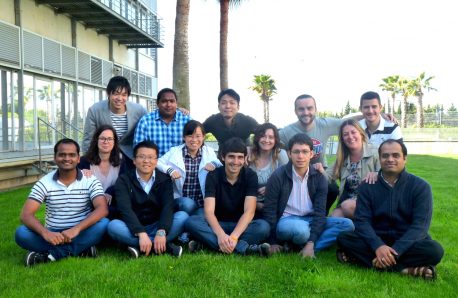Urakawa
Research group

Abstract
We develop novel heterogeneous catalysts and catalytic processes with the aim to minimize the energy usage and negative impacts of such processes on environment while achieving high product yield and selectivity. We take a multi-disciplinary approach based on material science, reaction engineering, and in situ / operando spectroscopy to gain solid comprehension of the active sites and the transformation pathways. Currently our major attentions are given to the conversion of CO2 and CO2-derived chemicals into fuels and useful chemicals and also to the production of hydrogen, the important molecule for CO2 reduction. Also, powerful in situ / operando spectroscopic tools for studying solid materials and gas-solid and solid-liquid interfaces are being developed and applied to shed light on catalytic reaction mechanisms.
Topics addressed
- Catalytic CO2 conversion
- Operando visualization – DMC synthesis from CO2 and methanol
- Novel materials for electrocatalytic water splitting
- Operando IR study of gas sensing mechanisms
Articles
“CO2 activation over catalytic surfaces”
ChemPhysChem (2017) 18, 3135-3141
A. Álvarez, M. Borges, J.J. Corral-Pérez, J. Giner-Olcina, L. Hu, D. Cornu, R. Huang, D. Stoian, A. Urakawa
“Temperature-Dependent NO2 Sensing Mechanisms over Indium Oxide”
ACS Sensors (2017) 2, 1272-1277
S. Roso, D. Degler, E. Llobet, N. Barsan, A. Urakawa
“Challenges in the Greener Production of Formates/Formic Acid, Methanol, and DME by Heterogeneously Catalyzed CO2 Hydrogenation Processes”
Chemical Reviews (2017) 117, 9804–9838
A. Álvarez, A. Bansode, A. Urakawa, A.V. Bavykina, T.A. Wezendonk, M. Makkee, J. Gascón, F. Kaptejin
“CO2 Catalysis”
ChemSusChem (2017) 10, 1036-1038
A.W. Kleij, M. North, A. Urakawa
“Solution combustion synthesis of highly dispersible and dispersed iridium oxide as anode catalyst in PEM water electrolysis”
Journal of Material Chemistry A (2016) 5, 4774-4778
M.G. Chourashiya, A. Urakawa
“CO2-to-Methanol Hydrogenation on Zirconia-Supported Copper Nanoparticles: Reaction Intermediates and the Role of the Metal-Support Interface”
Angewandte Chemie International Edition (2017) 9, 2318-2323
K. Larmier, W.-C. Liao, S. Tada, E. Lam, R. Verel, A. Bansode, A. Urakawa, A. Comas-Vives, C. Copéret